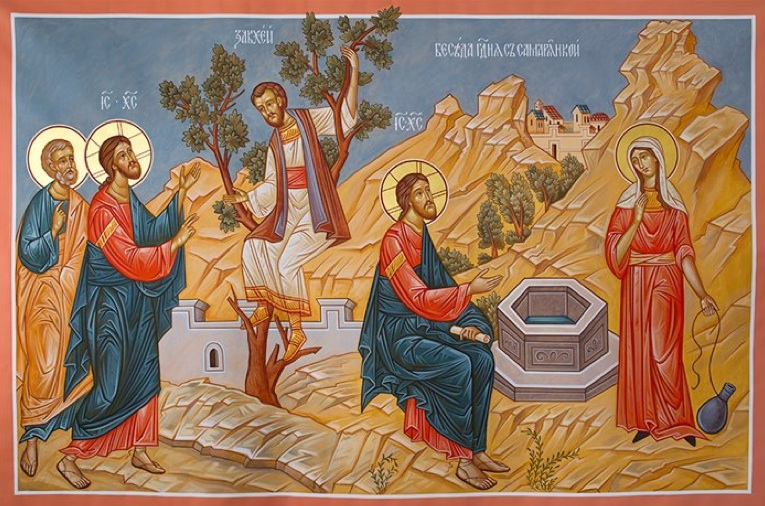



Pope Francis' Homily - Solemnity of the Conversion of St. Paul the Apostle
Salt + Light Media
Sunday, January 25, 2015

Conclusion of the Week of Prayer for Christian Unity
January 25, 2015

At 5:30 this evening (Rome time) in the Basilica of St. Paul outside the walls, Pope Francis presided at the celebration of Second Vespers for the Solemnity of the Conversion of St. Paul the Apostle. This ceremony formally concludes the Week of Prayer for Christian Unity which had as its theme this year: “Give me some water to drink” (John 4:7), taken from John’s story of Jesus’ encounter with the Samaritan woman. Many representatives of other Christian Churches and Ecclesial Communities present in Rome took part in this ceremony. At the end of the Vespers and before the final blessings, Cardinal Kurth Koch, President of the Pontifical Council for the Promotion of Christian Unity greeted the Holy Father.
Here below is the Vatican translation of the Pope’s homily which was delivered in Italian.
On his way from Judea to Galilee, Jesus passes through Samaria. He has no problem dealing with Samaritans, who were considered by the Jews to be heretics, schismatics, separated. His attitude tells us that encounter with those who are different from ourselves can make us grow.Weary from his journey, Jesus does not hesitate to ask the Samaritan woman for something to drink. His thirst, however, is much more than physical: it is also a thirst for encounter, a desire to enter into dialogue with that woman and to invite her to make a journey of interior conversion. Jesus is patient, respectful of the person before him, and gradually reveals himself to her. His example encourages us to seek a serene encounter with others. To understand one another, and to grow in charity and truth, we need to pause, to accept and listen to one another. In this way, we already begin to experience unity.The woman of Sychar asks Jesus about the place where God is truly worshiped. Jesus does not side with the mountain or the temple, but goes to the heart of the matter, breaking down every wall of division. He speaks instead of the meaning of true worship: “God is spirit, and those who worship him must worship in spirit and truth” (Jn 4:24). So many past controversies between Christians can be overcome when we put aside all polemical or apologetic approaches, and seek instead to grasp more fully what unites us, namely, our call to share in the mystery of the Father’s love revealed to us by the Son through the Holy Spirit. Christian unity will not be the fruit of subtle theoretical discussions in which each party tries to convince the other of the soundness of their opinions. We need to realize that, to plumb the depths of the mystery of God, we need one another, we need to encounter one another and to challenge one another under the guidance of the Holy Spirit, who harmonizes diversities and overcomes conflicts.Gradually the Samaritan woman comes to realize that the one who has asked her for a drink is able to slake her own thirst. Jesus in effect tells her that he is the source of living water which can satisfy her thirst for ever (cf. Jn 4:13-14). Our human existence is marked by boundless aspirations: we seek truth, we thirst for love, justice and freedom. These desires can only be partially satisfied, for from the depths of our being we are prompted to seek “something more”, something capable of fully quenching our thirst. The response to these aspirations is given by God in Jesus Christ, in his paschal mystery. From the pierced side of Jesus there flowed blood and water (cf. Jn 19:34). He is the brimming fount of the water of the Holy Spirit, “the love of God poured into our hearts (Rom 5:5) on the day of our baptism. By the working of the Holy Spirit, we have become one in Christ, sons in the Son, true worshipers of the Father. This mystery of love is the deepest ground of the unity which binds all Christians and is much greater than their historical divisions. To the extent that we humbly advance towards the Lord, then, we also draw nearer to one another.

Her encounter with Jesus made the Samaritan women a missionary. Having received a greater and more important gift than mere water from a well, she leaves her jar behind (cf. Jn 4:28) and runs back to tell her towns people that she has met the Christ (cf. Jn 4:29). Her encounter with Jesus restored meaning and joy to her life, and she felt the desire to share this with others. Today there are so many men and women around us who are weary and thirsting, and who ask us Christians to give them something to drink. It is a request which we cannot evade.In the call to be evangelizers, all the Churches and Ecclesial Communities discover a privileged setting for closer cooperation. For this to be effective, we need to stop being self-enclosed, exclusive, and bent on imposing a uniformity based on merely human calculations (cf.Evangelii Gaudium, 131). Our shared commitment to proclaiming the Gospel enables us to overcome proselytism and competition in all their forms. All of us are at the service of the one Gospel!In this joyful conviction, I offer a cordial and fraternal greeting to His Eminence Metropolitan Gennadios, the representative of the Ecumenical Patriarch, to His Grace David Moxon, the personal representative in Rome of the Archbishop of Canterbury, and to all the representatives of the various Churches and Ecclesial Communions gathered here to celebrate the Feast of the Conversion of Saint Paul. I am also pleased to greet the members of the Joint Commission for Theological Dialogue between the Catholic Church and the Orthodox Churches, and I offer them my best wishes for the fruitfulness of the plenary session to be held in these coming days. I also greet the students from the Ecumenical Institute at Bossey, and the young recipients of study grants from by the Committee for Cultural Collaboration with the Orthodox Churches, centred in the Pontifical Council for Promoting Christian Unity.Also present today are men and women religious from various Churches and Ecclesial Communities who have taken part in an ecumenical meeting organized by the Congregation for Institutes of Consecrated Life and for Societies of Apostolic Life, in conjunction with the Pontifical Council for Promoting Christian Unity, to mark the Year for Consecrated Life. Religious life, as prophetic sign of the world to come, is called to offer in our time a witness to that communion in Christ which transcends all differences and finds expression in concrete gestures of acceptance and dialogue. The pursuit of Christian unity cannot be the sole prerogative of individuals or religious communities particularly concerned with this issue. A shared knowledge of the different traditions of consecrated life, and a fruitful exchange of experiences, can prove beneficial for the vitality of all forms of religious life in the different Churches and Ecclesial Communities.
Dear brothers and sisters, today all of us who thirst for peace and fraternity trustingly implore from our heavenly Father, through Jesus Christ the one Priest, and through the intercession of the Blessed Virgin Mary, the Apostle Paul and all the saints, the gift of full communion between all Christians, so that “the sacred mystery of the unity of the Church” (Unitatis Redintegratio, 2) may shine forth as the sign and instrument of reconciliation for the whole world.
Related Articles:
<<
SUPPORT LABEL
$50
$100
$150
$250
OTHER AMOUNT
DONATE
Receive our newsletters
Stay Connected
Receive our newsletters

Stay Connected







